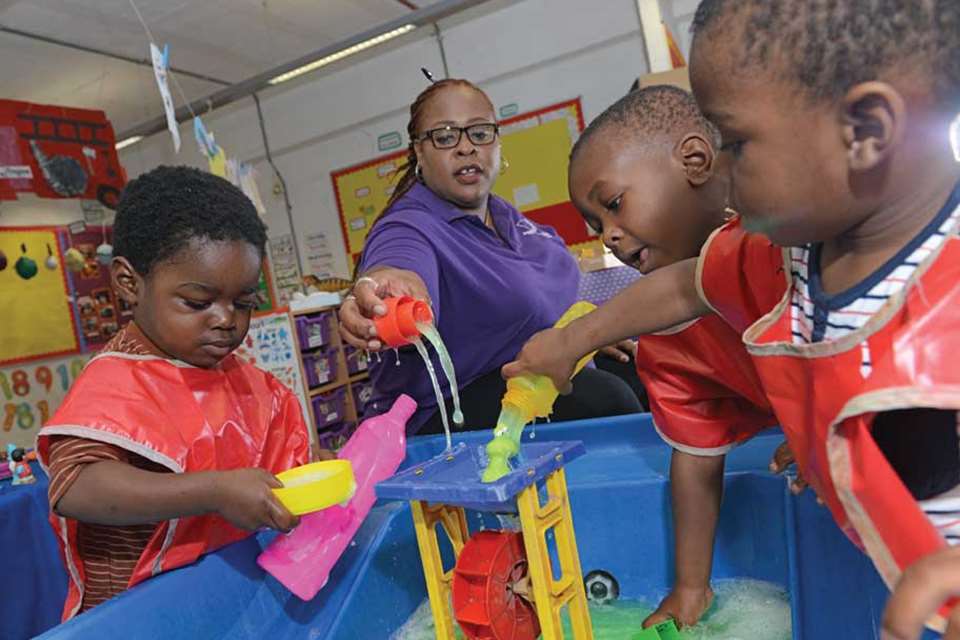Nursery Management: Special Educational Needs - Calling in the specialists
Charlotte Goddard
Monday, September 22, 2014
Recent changes to the law on special educational needs provision have been dubbed the most significant in 30 years. Charlotte Goddard looks at the vital role of SENCOs.

In a playroom at Northend Nursery, in Erith, Kent, 13 of 24 children have additional needs. Each child's key person works with him or her on a daily basis, but there is a need for someone to co-ordinate the provision and ensure that the children get the support they require. That someone is Marie Johnson, the nursery special educational needs co-ordinator (SENCO) and also deputy manager.
'If a child is not progressing at the right rate, practitioners let me know,' says Ms Johnson. 'I observe, and if I agree I support them to put strategies in place. If it feels like they are still not making progress we draw up a plan, taking advice from other professionals and parents.'
The techniques and strategies used depend on the child and his or her needs, she says. 'If the child is having trouble pronouncing "s", for example, we might do songs or stories with lots of words beginning with "s", or "silly soup" with a group of things beginning with "s".'
A child on the autistic spectrum might require a more visual approach. 'If the child's understanding is not clear we might use visual timetables - take a photo of them having snacks, playing with bricks, breaking the day into bite-size pieces,' says Ms Johnson.
New code of practice
Until now, all nurseries have been required to designate a member of staff as SENCO. In maintained nurseries this role must be taken by a qualified teacher.
But the new SEND (Special Educational Needs and Disability) Code of Practice, which comes into force this month, sees 'member of staff' become 'person'. In theory this means that a non-maintained nursery could identify an external professional to take on the SENCO role, perhaps someone working across a number of nurseries - as long as that nursery was still meeting the other requirements of the code.
This would be similar to the way childminders operate. They are 'encouraged' (using wording from the code) to identify someone who would cover a number of childminders, whether that is the local authority area SENCO or someone working for one of the new childminder agencies.
In practice, however, settings will find it difficult to meet their statutory obligations without identifying a SENCO on their team. Nicola Gibson, inclusion manager at the Pre-school Learning Alliance (PLA), says, 'I don't think most private, voluntary and independent (PVI) settings have any option other than to identify a SENCO, because they still have to meet specific law and policy requirements set out in the Equality Act, SEND Code of Practice and the provisions of the Early Years Foundation Stage (EYFS).' Angela Scott, service leader for SEND at training provider Eastern Leadership Centre, agrees. 'As a best practice measure, why would you not? There will always be a child or children in your setting who need support, so it makes sense to identify someone in the setting.'
Early intervention
The emphasis on early intervention runs through the Children and Families Act, which set out the legislative framework for the new SEND system and was brought in this March. The accompanying code of practice places a responsibility on nurseries to identify additional needs early on, saying, 'Prevention, for example using the outcomes of developmental assessments as outlined in the EYFS to target early help for children experiencing developmental delay, can reduce need for specialist services later'.
'Early intervention is crucial,' says Jo Nice, SENCO at the Seymour House group of nurseries and head of early years practice at its Springfield Road branch. 'The earlier a need is established, the earlier strategies and techniques can be implemented.'
In some ways this factor takes some of the expectation off a SENCO, placing greater importance on the part played by a child's key person, particularly in the initial identification of needs. But the necessity for someone to take ownership of that process has never been greater, particularly as budget cuts can lead to less support from external professionals such as health visitors.
Best practice
The PLA has produced guidance on the new SEND framework and code of practice. 'A SENCO should have good understanding of child development and some knowledge and experience of working with children with learning delays and difficulties, a can-do attitude to inclusive practices, and a familiarity with relevant Government legislation and policy on equality and SEND,' says Ms Gibson.
SENCOs should also, she says, recognise what good practice looks like and be able to promote it, be able to apply a graduated approach to identifying and meeting children's needs, and be able to challenge and overcome negative attitudes and discriminatory behaviours from staff, parents and sometimes children.
SENCOs need to keep their own and the rest of the team's skills and knowledge up to date, work with the staff team to ensure each child has an effective means of communication, be familiar with local services and able to signpost parents to them, and refer children not progressing to the attention of the local authority. They should work with the local authority on the creation of a 'local offer' for parents and children, which sets out, in one place, information about services available for children and young people in their area who have SEND.
'We would say that this is what is needed to help set high standards for SEND provision and conform to the law, but it might not be feasible for all settings,' says Ms Gibson. 'It is quite a challenge to do all that.'

SEND training
Most nurseries choose to appoint a member of the management team as SENCO. The Seymour House group has a dual leadership scheme, with a manager and a head of early years practice in each setting. The early years head tends to take on the SENCO role in each setting. SENCOs in PVI settings are not required to hold any particular qualifications, but Seymour House's SENCOs are all qualified teachers or have Early Years Professional Status.
Ms Nice says the SENCOs are required to undertake two days of local authority training and keep themselves up to date as well as sharing best practice with each other and the team. 'We had a reflective practice-themed week across all eight nurseries earlier this year, focused on speech and language needs,' she says. 'The programme of practical activities extended practitioners' knowledge and confidence, giving different strategies the team could draw on, such as auditory bombardment and a "Mr Tongue" book, which helps children to practice and strenghten their oral movements.'
Some small nurseries say releasing a SENCO for training is tricky. And while many local authorities still offer induction training for PVI SENCOs, budget pressures have led to fewer opportunities for continuing professional development.
But Beverley Middleton, manager of Alec Hunter Pre-School in Essex, says, 'Training is ongoing. It never stops because of the changing environment that we work in.'
The Eastern Leadership Centre is working on a qualification that takes in the impact of the latest reforms as well as the characteristics of different SENDs and general best practice. Launching this autumn, the Level 3 Certificate for SENCOs in Early Years involves seven hours of flexible training.
SEND in schools
The thrust of the reforms on SEND is towards different agencies working together and sharing information - what the National Association of Head Teachers calls a 'clear cultural shift' from what went before. The role of a nursery SENCO is to put the provision in place to give a child support to make the best progress they can in life.
The transition to primary school is a particularly important time for sharing - with parental consent - information, says Ms Middleton. Her pre-school has an experienced management team, and some have been with the setting for more than 20 years. Three of the team, including the manager, are skilled in supporting children with additional needs, so the appointed SENCO can draw on the support of the others.
Ms Middleton says, 'We have had the children for such a long time, going through initial assessment and putting strategies in place to support them, and so we know what works. We arrange for the schools to visit the children in pre-school and pass on their individual education plans so everyone has a copy. Parents can go through any concerns they have, and we can pass on the strategies we use.'
It has been a busy summer for SENCOs as they try to get their heads around how the new reforms affect them, their nurseries and the children they work with. But their job is more important than ever.







